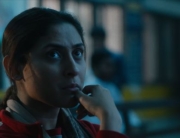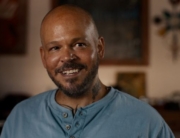
Who knows how much a frail monarch butterfly has traveled and endured at first glance? If you investigate further, you will be impressed how far this insect has flown on its intercontinental route to hibernation. This factoid allows us to understand the species as a fundamental symbol in Son of Monarchs.
Mendel (Tenoch Huerta Mejía) has dedicated his professional life in genetics. His passion extends back to his childhood. (His current life as a Mexican immigrant in New York couldn’t be more different than the one he had growing up in Michoacán, the western state with one of the largest populations of monarchs.) The first scenes reveal Mendel as an adult dissecting a butterfly and then as a child with his older brother exploring a forest, the habitat of the species. He was named after the famous “father of the genetics,” Gregor Mendel, which seems like predestination.
Written and directed by French-Venezuelan director Alexis Gambis, Son of Monarchs is a subtle work concerned with the intimate relationship between the real and the fantastic, fed by memory and imagination. Besides the continuous flashbacks, other types of evocations may come from the realm of the fantastic (rituals, nightmares, oral myths) that create a certain visual poetry in how this story is told, though strange imagery sometimes threatens to overshadow the narrative, though briefly.
After Mendel returns home to attend his grandmother’s funeral, the contrast with his life in New York highlights how radically different his life would have been if he hadn’t left. In the idyllic visions from the past, the movie illuminates the relationship with his brother (his child hero, though now they barely talk to each other), his best friend from school, and an innocent first love (now a married woman with many children). Michoacán now looks less splendid from what he often remembers, but this is much more than the story of an immigrant who has “made it.”
In his lab, Mendel edits through genetic modification the colors of a butterfly’s wing. The biologist also retells the legend about the monarchs’ origins: they were souls of relatives transformed by gods. It seems that a part of Mendel wants to make room for wonders that goes beyond scientific discoveries. That he also becomes involved in Indigenous rituals only increases the rich ambivalence surrounding this character. However, the film never makes a full turn into the supernatural, although it leaves the impression that a mystery will be revealed at any minute. More weight is given to the child’s play that Mendel remembers or the consequences of a family tragedy that left him an orphan.
The balancing act of settings, tones, and possible interpretations makes Son of Monarchs a risky proposition that could have derailed because of a small misstep. Luckily, the film doesn’t, even in moments where it seems much more enamored of its metaphors than its characters. The monarchs may seem an on-the-nose symbol initially, but Mendel’s complex experience works better as a reminder that the process of being an immigrant is circular and lifelong. Once you fly away, you’re flying forever.






Leave A Comment